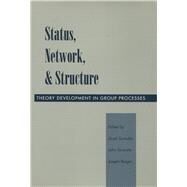- ISBN: 9780804728447 | 0804728445
- Cover: Hardcover
- Copyright: 9/1/1997
This book challenges much that has been written about the decline of sociology as a vital, essential area of inquiry into the human condition. Against this Greek chorus of woe, these papers show by example that sociology can make progress, select significant problems, and cumulate an integrated and coherent set of findings and theoretical understandings. Although the twenty papers in the book engage a wide variety of issues, they are united by their adherence to one of the most active and successful traditions in sociology, the group process tradition. Group process research programs can examine tractable problems posed by social psychological phenomena for which sociology has the best methods of study; they have the potential for a hardware-based, technological research front that discovers new phenomena; and they come closest of all approaches in sociological research to using cognitive criteria in the choice of problems and to studying immutable phenomena. The overall aim of the book is to provide models for researchers struggling to develop, construct, and integrate coherent sociological theory and knowledge. The papers are grouped around three themes: (1) the problem of theory construction in sociology, including what is meant by "theory" and the methods of testing it, particularly empirical testing; (2) the extension and elaboration of existing theories of group processes, notably in the study of status, sentiment, and the comparison process; and (3) the theoretical issues at the intersection of social structures, the pattern of connection in social networks, and the process of rational choice.







